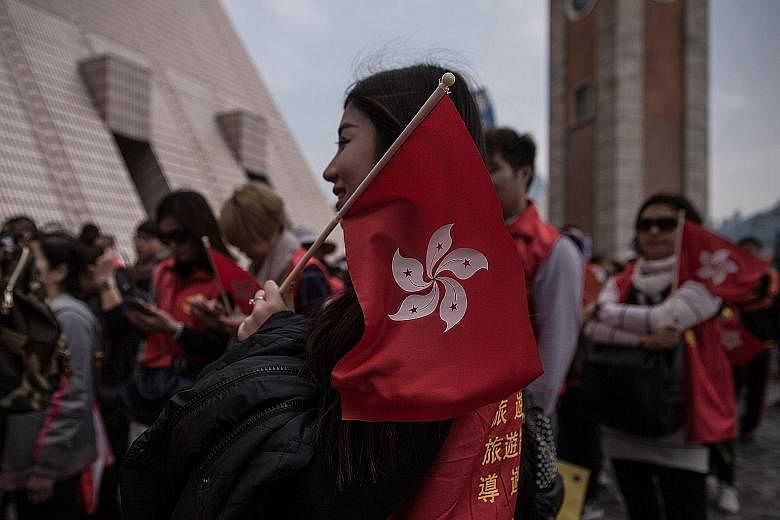As China's top legislature and top political advisory body - the National People's Congress (NPC) and the Chinese People's Political Consultative Conference (CPPCC) National Committee - convened in Beijing this month, a video team from the South China Morning Post took to the streets in Hong Kong to gauge how much people knew about the "two sessions", as they are known colloquially on the mainland.
Most respondents - judging even by their rather comical facial expressions - were embarrassingly ignorant of what is going on in Beijing.
Viewed from a broader perspective, the results of the quick quiz reflect just how ill-informed many Hong Kong people are when it comes to things happening on the mainland. The "two sessions" are attended by basically the country's entire class of governing elites, who represent virtually all walks of society and all ethnicities in China. Therefore, the event is an important bellwether for assessing China's development, and an excellent opportunity for Chinese leaders to showcase their skills and experience in governance.
It has been almost 19 years since Hong Kong was returned to the motherland, so no excuses can be justifiably accepted for such ignorance. Even Western media outlets are covering the annual "two sessions" with greater enthusiasm, because China is now too significant to ignore.
Quite a sizeable minority of Hong Kong people are still obsessed with the colonial era. This lends some momentum to the rising tide of radical "localism" in Hong Kong. This is also partly to blame for their profound ignorance of China's development. To make it worse, they do not really feel ashamed about this and do not seem to care. But the reality is that Hong Kong cannot afford to go solo. The city must make the most of its proximity to the mainland for a better future.
 A rally on Feb 14 in support of how the police handled the Mongkok riots on Feb 9. Political conflicts in Hong Kong could be taking the focus away from the need to focus on economic imperatives that will ensure its future as a super-connector linking China to the rest of the world. PHOTO: AGENCE FRANCE-PRESSE
A rally on Feb 14 in support of how the police handled the Mongkok riots on Feb 9. Political conflicts in Hong Kong could be taking the focus away from the need to focus on economic imperatives that will ensure its future as a super-connector linking China to the rest of the world. PHOTO: AGENCE FRANCE-PRESSE
It is widely recognised that many factors contributed to Hong Kong's success in the past, but a key component was undoubtedly the resilience and ability to adapt demonstrated by the people of the Special Administrative Region (SAR) - the "Hong Kong spirit". Since the handover, "mainland-Hong Kong integration" has become much more than a popular catchphrase. It is an inescapable trend. Notably, the role of the Hong Kong Special Administrative Region was written into the 12th Five-Year Plan (2011-15) - a historical first. The latest five-year blueprint, which covers 2016-20, has just been unveiled. It will continue to provide ample opportunities for Hong Kong to prosper. However, the people of Hong Kong will once again face a tough test of whether they are able to move with ever-changing times.
Time might not be on Hong Kong's side. Fortunately, at this stage, both the central and SAR governments still believe the city should and can play a more positive role in national affairs - and share the dignity and glory of being Chinese citizens with their compatriots on the mainland. Just as Mr Wang Guangya, the director of the Hong Kong and Macau Affairs Office of the State Council, has emphasised, the SAR should be able to find its "new positioning" by combining the nation's strategy with the city's competitive advantages.
Hong Kong was unique and still is. As China's most open city and one of the world's freest economies, it still has an unrivalled edge in serving as the country's "super-connector". Recently, State Councillor Yang Jiechi even made an unprecedented call for Hong Kong delegates attending the "two sessions" to contribute wherever possible to developing Sino-American relations and forging "a new type of major-power relationships".
The "new normal", a catchphrase that is gaining increasing popularity on the mainland, is also relevant to the situation in Hong Kong. The term was used by President Xi Jinping in May 2014 to depict China's new phase of development after more than three decades of double-digit growth. He said the Chinese people must adapt to the "new normal" in the wake of the economic slowdown, while the world's second-largest economy is still enjoying a "significant period of opportunity". Hong Kong needs to adapt to its "new normal" too, for example, through ever stronger integration with the mainland in social, economic and cultural areas.
What is unusual now might turn out to be normal. For instance, before 1997, very few Hong Kong locals could speak fluent Putonghua (Mandarin) but, nowadays, many can.
Hong Kong's past glory was earned primarily through its economic achievements. Therefore, boosting the economy should come first. This means the politicisation of economic issues should be avoided. If the SAR becomes marginalised or even irrelevant in the country's larger plan, then its good days will be numbered. It is the Hong Kong people who will eventually bear the brunt of the SAR's demise from endless political bickering.
CHINA DAILY /ASIA NEW NETWORK

